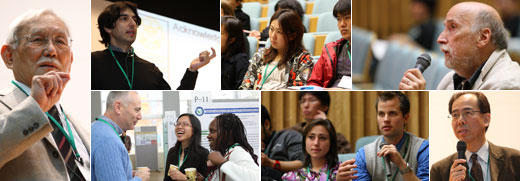NAIST Global COE International Symposium 2009: Environmental Adaptation

The 4th Global COE International Symposium, on the theme of Environmental Adaptation, was held on November 12-13, 2009 in Millennium Hall, NAIST. The aim of the Symposium was to enhance international and regional research cooperation, particularly between the tripartite working group of CAS-IGDB (China), UCD-CBS (USA), and NAIST-BS (Japan). For these purposes, 16 eminent international scientists, including four from overseas and three from NAIST, were invited to give presentations on their current research.
Professors Hiroshi Takagi and Kenji Kohno organized this Symposium, and we introduced hot research topics on the wide range of molecular strategies that are used by various organisms (bacteria, fungi, yeasts, plants and mammals) for their survival and adaptation under environmental stress conditions. These strategies include programmed cell death, hypoxia response, NO synthesis, proteotoxic response, ER quality control, redox homeostasis, deep water adaptation, photosynthetic supercomplex remodeling, innate immunity, heat response, cold adaptation, genomic stability, and translesion DNA synthesis. Through this Symposium, we could understand in depth both common and different features between organisms, and discuss the global contribution of future biotechnology in terms of food, environmental and medical issues.
Approximately 480 participants attended the Symposium, including 34 students from the preceding GCOE International Student Workshop and four exchange students from the University of Minnesota who presented their work in a poster session. At the mixer in the evening of the first day, the participants enjoyed lively cross-cultural interactions with each other.
In the context of the GCOE program, this 4th Symposium turned out to be a great success - particularly the students' poster session in which the younger participants could receive valuable suggestions for their individual research and initiate potential collaborations. In addition, Professors Masayori Inouye (Robert Wood Johnson Medical School, U.S.A.) and Robert P. Fuchs (CNRS Marseille, France) gave us important personal messages, concerning scientific attitude, enthusiasm and philosophy, that should strongly encourage young scientists to conduct their research.
We hope that this Symposium will lead to new research concepts and directions across the broad field of environmental response and adaptation, and that the NAIST participants will enhance their own motivation to expand their international outlook, activity and collaboration to a higher level.
